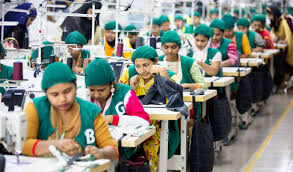By Mir Afroz Zaman, POBNEWS24, Dhaka, Nov 29, 2022 : The garment sector of Bangladesh is under three-fold pressure due to the global recession.
Entrepreneurs of this sector say that due to the impact of the global recession, on the one hand, the purchase orders are decreasing, on the other hand, they are not able to produce as much as the purchase orders are available due to the lack of raw materials and electricity.
Garment traders say that their dependence on diesel has increased to manage the situation for now. As a result, their production costs are also increasing.
Many owners are already in financial crisis and are not able to pay wages to their workers on time. In the overall situation, many factories of textile and ready-made garments industry are closing down. Many factories are at risk of closure. In this situation, workers’ unrest may arise.
Concerned sources said that along with the fear of disaster in export earnings, the government’s revenue from this sector is also decreasing.
Basically, European countries and the United States are considered as the biggest markets for Bangladeshi-made garments. After the corona epidemic, due to the Russia-Ukraine war, economic recession has occurred in these countries.
In addition to the inflationary pressure in those countries, the price of other commodities has also increased due to the increase in the price of fuel oil in the international market.
This has created an economic crisis in those countries, which has a direct impact on the garment industry of Bangladesh.
Meanwhile, due to the global crisis, many well-known buyers in the world, including Walmart, have canceled orders.
Production is down
According to BGMEA and BKMEA, two associations of Bangladesh’s garment industry owners, production in textile and dyeing factories fell by 50 percent and ready-made garments by 30 percent. As a result, the shipment cannot be done on time. Due to this, many foreign buyers are canceling purchase orders. At least 30 percent of purchase orders have already been cancelled. Besides, 15 percent has been suspended. This increases the stock lot of clothing in the factory. New purchase orders are also not coming in much.
According to the information of the two organizations, about 60 percent of the factories are not getting the bill properly even after sending the goods to foreign buyers. On the other hand, even if production cost increases due to energy problem, buyers are not willing to increase the price of clothes.
Several factory owners said that many buyers had suspended product deliveries on last August and September. Same situation is for October and current November orders. Some buyers are asking for the current purchase order to be delivered in February-March. In some cases, deliveries are delayed by six months.
In this context, executive president of BKMEA, the association of knitwear industry owners, Mohammad Hatim said, “Due to inflationary pressure worldwide, including Europe-America, clothing orders have decreased.” Now they are unable to produce according to the reduced demand due to electricity and gas crisis. He said, “Due to the lack of purchase, he is able to use only 50 percent of the production capacity of his own factory.”
Mohammad Hatim also said that he has been associated with garment business for 36 years. In this 36 years, this is the biggest crisis in the garment sector. In the last two months, he has terminated 15 percent of the workers and said that many factories like his have been forced to lay off 5 to 10 percent of workers in the last two months due to the ongoing crisis.
Fazlul Haque, managing director of Narayanganj-based knitwear factory Plummy Fashions Limited, said, on the one hand, the orders are decreasing, on the other hand, due to being forced to use diesel, he is spending additional Tk. 25 to 30 lakh a month.
He said that other factory owners have also informed him of the increase in their expenses due to the same reason.
Traders of Chittagong said that the depot owners have increased the service charge by 35 percent due to the increase in the price of fuel oil. This has increased their expenses. But not getting additional price. As a result, the factories have to face losses.
Besides, two units of garment factory, manufactured by Deeps Apparels Limited on New Charchaktai Road, Karnaphuli Setu area of Baklia police station of Chittagong city, were suddenly closed. More than 600 workers have fallen to troubles.
According to the owners, due to the impact of the global economic recession, there was no other option but to close the two factories. Because, for the past few months, no order of clothes from foreign buyers was coming to the two factories.
Some factory owners have claimed that there is a crisis in most of the factories in the country but they are not getting any support from the country’s banks. There is no assurance of cooperation even from the government.
As a result, many employers have already started laying off their workers. On an average, 5 to 10 percent of workers are laid off in factories. Factories that are not members of BGMEA and BKMEA are in even worse condition.
In this context, executive director of private research institute ‘Policy Research Institute-PRI’ Ahsan H. Mansoor said, ‘There is no chance of improvement in garment exports until next February and March. Until then, such situation may continue. However, the export order may increase after six months.
In this context, BGMEA President Farooq Hasan said, “Due to the Russia-Ukraine war, orders and prices of clothes have started to decrease since last July. Besides, there is already a gas-electricity crisis. We are not getting electricity even at higher prices. We are forced to run the factory with a generator. As a result, the cost of production is increasing day by day.
END/







